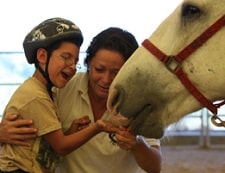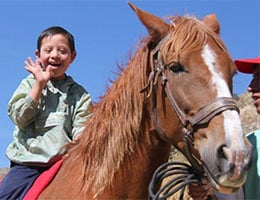 The notion of equine therapy is not included in the dictionary prepared by the Royal Spanish Academy ( RAE ). In any case, its use is frequent in our language.
The notion of equine therapy is not included in the dictionary prepared by the Royal Spanish Academy ( RAE ). In any case, its use is frequent in our language.
Equine therapy is formed from two terms: equine (horse) and therapy (treatment). Equine therapy, therefore, is a treatment that is developed with the intervention of horses .
Typically equine therapy is used synonymously with hippotherapy . While the etymology of equine therapy refers to the Latin equus ( "equine" ), the root of hippotherapy is found in the Greek hippos ( "horse" ). You can even talk about equestrian therapy .
In equine therapy, the horse is taken as a rehabilitative and integrative element that helps individuals with some kind of disability to develop physically, cognitively, socially and emotionally . This therapy is usually complemented with other conventional treatments.
Among the benefits that equine therapy provides to its patients are the reduction of muscle spasticity, psychomotor stimulation and improvement of balance. Horses also help develop communication skills and increase a person's confidence.
Equine therapy sessions include different exercises on the horse, circuit walking and handling the animal 's reins. As the activities are carried out outdoors and in contact with nature, the environment is another factor that contributes to the well-being of the subject.
While the term hippotherapy is considered a synonym for equine therapy , it can also be understood as one of several techniques that the latter includes. In particular, it is about taking advantage of certain aspects of contact with the horse, such as the transmission of body heat and the impact that three-dimensional movement and rhythmic impulses have on the patient.
In other words, mere contact with the animal can help certain people treat or even overcome their physical disabilities, both acquired and congenital.
Among the techniques of equine therapy there is also therapeutic riding , which is aimed at overcoming certain disorders in learning and adaptation, through the motivation that the horse produces in patients with certain disabilities . Riding a horse can increase the power of concentration and attention, in addition to stimulating the senses and emotions.
Teaching patients to overcome certain guidelines on their own makes them more independent and increases their self-esteem.
 For those who practice horse riding for sport or fun but cannot do so normally due to a disability, there is adapted horse riding , which provides them with certain accessories to allow them to enjoy the experience.
For those who practice horse riding for sport or fun but cannot do so normally due to a disability, there is adapted horse riding , which provides them with certain accessories to allow them to enjoy the experience.
It is important to mention that, due to the lack of scientific studies that certify the benefits of equine therapy in the treatment of disabilities and mental illnesses , there are those who point it out as a pseudoscientific therapy .
On the other hand, there are animalistic positions, which oppose the exploitation of horses in any type of activity created by humans, including equine therapy. It is important to remember that horses do not choose to help patients, and the fact that these are jobs for healing purposes does not make them any less unfair to them than the tasks of agriculture, even though they physically require much less wear and tear.
Lovers of equine therapy promote it as "an approach to nature" to overcome certain health disorders, and this gives it a nuance of harmony that has little to do with what is happening in the background: therapists exploit horses, They use it for their own benefit , so we are not talking about a natural experience like soaking in hot springs.
